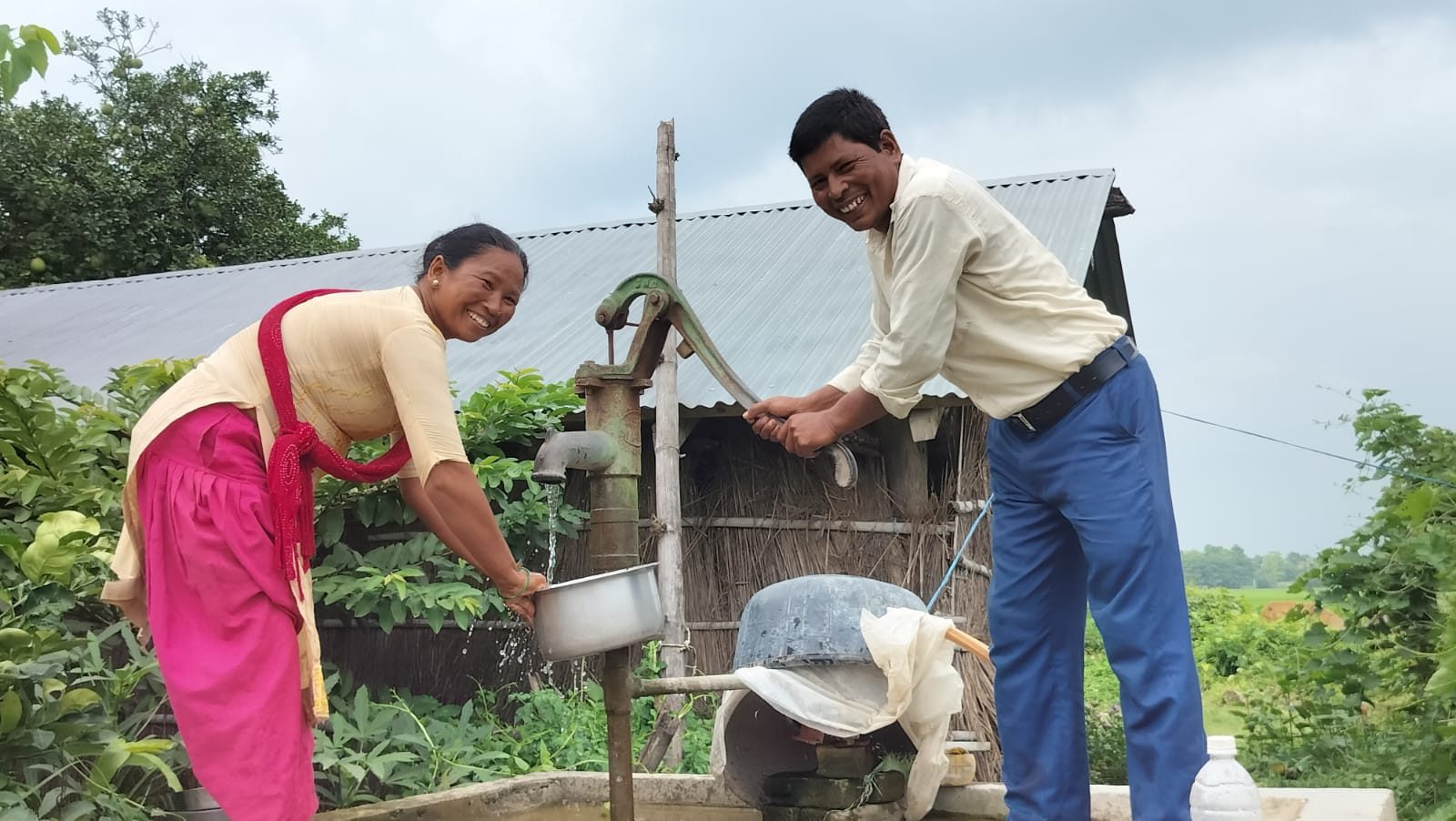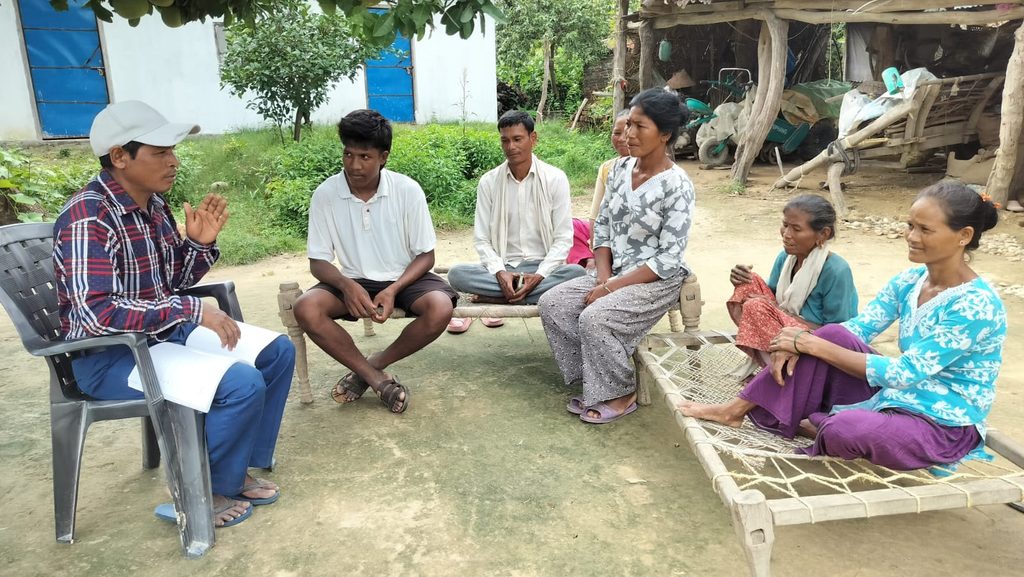Kaluram from farmer to involved parent
This Father’s Day, we honour Kaluram from Bardiya, who transformed from a traditional father into a Champion Father, breaking taboos and supporting his children’s health, education, and well-being.

In many rural communities, topics like menstruation, family planning, and adolescent emotions are often seen as women’s issues, things men do not usually discuss or get involved in. Kaluram, a 40-year-old farmer from a small village, once thought the same. Like many fathers, he believed that being a good parent meant focusing mainly on discipline and education, leaving other matters to women. But a father’s group meeting changed his perspective completely. This is the story of how Kaluram learned to break long-held taboos, open important conversations in his family, and become a Champion Father for his children and community.
From a traditional father to a new understanding
“My name is Kaluram, a farmer living in a small rural village with my family of 6, my wife, our 24-year-old son, daughter-in-law, young grandchild, and 19-year-old daughter. Life here follows the rhythms of the fields and the traditions passed down by our elders.”
“I studied only up to secondary school. Since then, I worked hard so my children could have better opportunities, especially a good education. For a long time, I thought being a good father meant making sure my children were disciplined and got good grades. I never paid much attention to their emotional struggles or topics like menstruation, relationships, or family planning. I believed those were women’s matters, things I didn’t need to be involved in.”
“When some neighbours invited me to a father’s group meeting, I was hesitant. I wondered, “Why should I go? What could I contribute?” It didn’t feel like a space for someone like me. But a good friend kept insisting, and finally, I agreed to attend out of curiosity.”
“At the meeting, I mostly listened quietly until a man called the Champion Father stood up and said, ‘We’re here to break household and community barriers in adolescent sexual and reproductive health and rights through male engagement.” Those words struck me deeply.”
Learning to see beyond old beliefs
“As the discussions went on, I heard things I had never really thought about. Adolescence is not just about school or discipline, it’s a time of big emotional and physical changes for both boys and girls. I learned about menstrual health and hygiene, something I had always considered only a woman’s concern. We talked about the dangers of early and forced marriage, teenage pregnancy, and the need for access to safe abortion.”
“We discussed family planning and why the gap between births matters, not just for mothers’ health but for the whole family’s well-being. I also learned about gender-based violence, how it often starts quietly at home, and how it impacts everyone. Most importantly, I realised the role fathers like me must play. Talking to our children about sex and relationships is not easy, but it is necessary.”
“At first, this was overwhelming. But then I thought about my own family. I shared my story with the group: “My wife and I focused only on our children’s studies. We wanted high marks and discipline, but never talked about what they might feel as teenagers. We never discussed love or relationships. Then our son married at 18, and within a year, we became grandparents. We had hoped he’d finish school first, but we never talked openly about planning a family. No one ever told us about family planning. Now, my granddaughter doesn’t even have a birth certificate. If I had known then what I know now, things would be very different.”
“That three-day meeting changed everything for me. I came home with a new understanding and a sense of responsibility.”

Becoming a Champion Father
“Now, every day during lunch, I sit with my wife, daughter, daughter-in-law, and even my sister. We talk openly about menstruation, teenage pregnancy, family planning, and respectful relationships. I used to think these were “women’s issues,” but now I see how wrong I was.”
“I had a serious conversation with my son and daughter-in-law. I told them, “Before having another child, there must be clear planning and agreement. Birth spacing is not just the mother’s responsibility; it is the father’s, too. A gap between children helps keep both mother and baby healthy.”
“I feel like I have become a different kind of father, not just a provider, but a guide, a listener, and an equal partner in parenting.”
“I also speak to other men in my village about what I have learned. I tell them, “If we fathers get involved in our children’s emotional and reproductive health, we can break harmful traditions and create a better future for our families.”
“I want to become a Champion Father myself, someone who guides other fathers who don’t yet understand their role. If we step forward and engage in these important conversations, we can break social norms and build healthier futures for our children.”
“I feel like I have become a different kind of father, not just a provider, but a guide, a listener, and an equal partner in parenting.”
Kaluram, a Champion Father
About the project
Funded by KOICA and implemented by RKJS in Bardiya, the adolescent sexual and reproductive health and rights project supports fathers through parents’ meetings. These sessions give men a safe space to learn about menstrual health, adolescent wellbeing, and open communication, helping them challenge harmful norms and better support their children.
Some fathers become “Champion Fathers,” role models who inspire others, promote positive parenting, and encourage male involvement in areas traditionally seen as “women’s issues.” This work is helping build supportive homes and stronger families in Bardiya.


